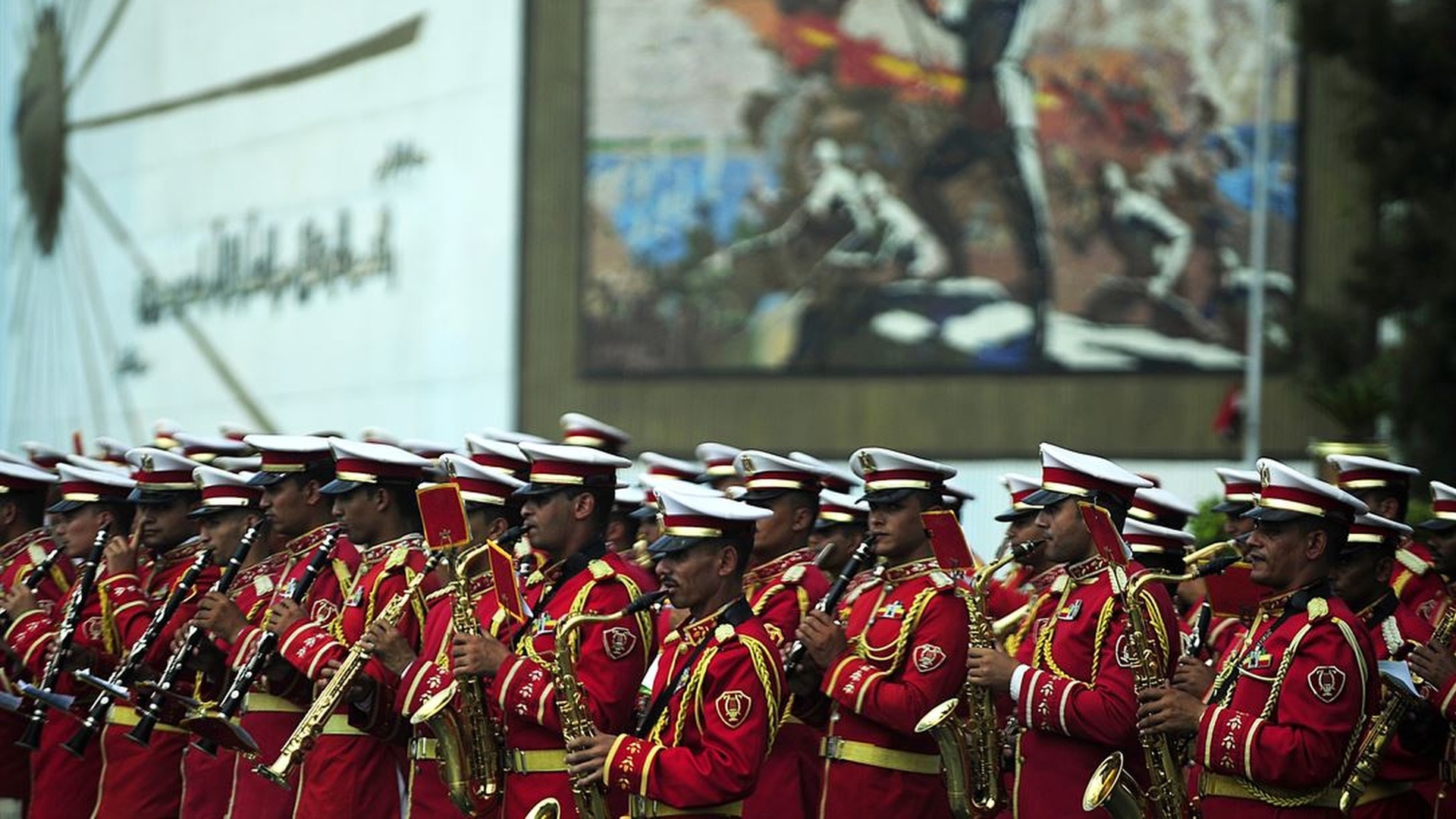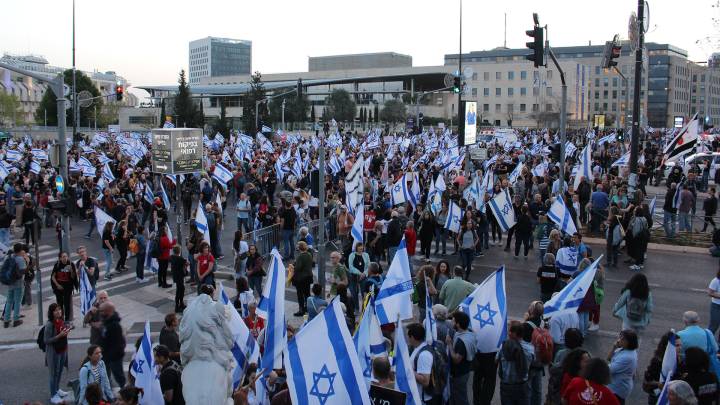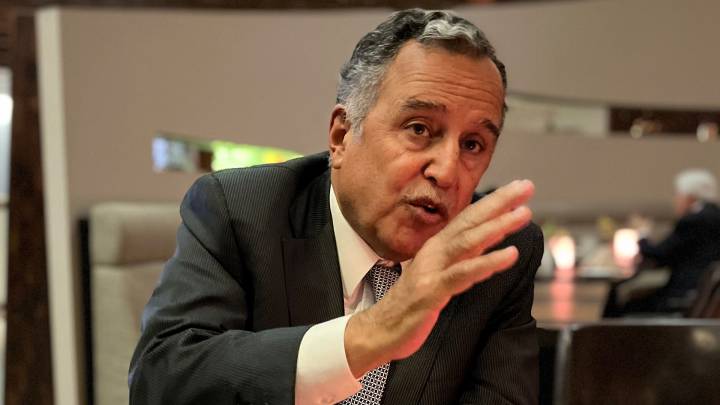Yezid Sayigh has spent many years closely examining the interdependence of the military and the economy in Egypt. He explains why investors are skating on thin ice putting their money into country and why the military is hiding in the TV market.
zenith: The involvement of the Egyptian military in the economy is nothing new. What has changed since Abdul-Fattah al-Sisi took office?
Yezid Sayigh: Two principal changes are the involvement of the military on a much, much larger scale than ever before in managing public works contracts on behalf of the government. There's been a qualitative shift, not just a quantitative one. The military not only oversees the implementation of the works by private contractors, but they are now directly involved in designing the tenders for these projects. They also accept bids whether on a competitive or a non-competitive basis. In other words, the military are playing a much, much bigger role in the volume of work they're managing. The second major change is that the military are now, and increasingly aggressively in the last three years, entering into major sectors of the national economy that they had previously been almost completely absent from, such as construction. They are also getting involved in the production of tradable commodities such as cement, steel, and fertiliser. And also they’re entering a few other sectors, such as media through direct ownership or front companies. Tawassul, which belongs to the Falcon Group, is one such company. In 2017 its acquired the TV stations, Al-Assema and Al-Hayat. They are entering directly into civilian markets in ways that affect pricing, supply and above all affects the entire market for private sector companies as well as civilian public companies.
What is the aim of the military’s foray into media production?
The critical question is why they would enter the media sector at all. It seems that their primary motive is to consolidate the hegemony of the Sisi administration over all public space and public discourse. This has led them finally into a field where they're also expected to produce entertainment and other forms of cultural production, as well as, more directly political content. It's not actually lucrative in terms of producing net profit for them. What we hear anecdotally is that the production of these companies has declined very significantly in terms of its public appeal. We're told often that the TV soaps or series that were produced for Ramadan last year were flops, like “Princess Beesa” for example. They tried to launch a Netflix imitation called “Watch iT” , which also flopped.
Why have these efforts in media production fallen short?
The military don't really understand how these markets work. They also don't know how to delegate actual management, production and design to the people who actually do. So the result is that the sector has incurred heavy losses. It's debatable whether some of the TV channels that they bought were ever actually profit making. The military seem not to have appreciated the costs and have been undertaking a number of measures over the last year, such as slashing staff or merging companies so as to save costs. None of this has been effective. I think they don't yet have a successful commercial strategy for this, but it's also not clear that it's producing the political, social and cultural consequences they wanted.
How can the Egyptian military afford such undertakings? Is it due to their access to cheap conscript labour?
I think that's a factor, but I think we should avoid exaggerating its importance. It obviously makes a significant difference to the turnover or at least net losses of companies. If they can use free labour, military companies or private contractors who they conscript labour to will benefit. Now, in some sectors like construction or farming, conscript labour is obviously going to be important in running the militaries petrol stations al-Wataniyya. But then there's other activities that the military are involved in and the bulk of the construction that is awarded to private sector contractors. Most of that is done by normal labour, not conscript labour. So it's difficult to establish an exact proportion, but I think that it really depends on the sector. Where the military will still make a profit is by squeezing the profit margins of the private contractors it works with so that it gets to keep an extra profit. Even when conscript labour is not involved, the military will find other ways of extracting a profit margin.
How much land does the Egyptian military really own?
When it comes to land the military has the power of approval. This means licensing for any civilian actor, whether an individual, a company or a government agency wishing to use any part of state land for any civilian purpose. It is established in law that the Ministry of Defence is one of several ministries, including antiquities and aviation, whose approval is required for certain land uses. This applies only specifically to so-called state land, which the World Bank estimates accounts for between 90-95% of the total surface area. In other words, all land that is not specifically registered as part of the municipality or is privately owned. Now, this confers a lot of leverage on the military. They can extract either bribes which individual officers may demand or donations to army funds from any civilian agencies or individuals who are trying to get the license to use the land. So, this obviously gives them a massive advantage, and represents a very significant disincentive for normal civilian economic development and private sector development, because the result is, of course, extra costs.
Is Egypt really “too big to fail” or is the Sisi regime taking international financial institutions and Western governments for a ride?
I think the main reason is that Western governments and international financial institutions are committed politically to maintaining stability in Egypt, pretty much regardless of the political ideology of those in power. They were willing to work also with the Muslim Brotherhood administration after the revolution of 2011. But, I believe, there is a clear preference for the authoritarian administration of President Sisi. So, their perception that Egypt's stability is important, is what very obviously shapes how they comment on Egypt's politics and its human rights record, which is completely appalling. And yet Western governments bend over backwards to talk about Sisi's commitment to a democratic path. All of this is because there's an overriding interest in keeping Egypt stable. What that means, in effect, also these governments, while having both political and economic concerns, will nonetheless continue to inject money into Egypt. Regardless of the fact that the only way the Egyptian economy has remained afloat over the past 60 years is because the government know they can always somehow get extra funding from outside sources. And that's the critical thing. The Egyptian administration understands that it's got this leverage, almost blackmail power, over any Western government and that this will always trump any other consideration, including economic effectiveness or financial integrity.
Why do potential investors in Egypt succumb to this blackmail?
It's very much a political commitment. And of course, we have to remember that for organisations like the IMF and the World Bank, Egypt is the client. They are there to serve the client. And therefore, they will very rarely, if ever, come out with any criticism of the host government. Finally, in September 2018 in one of the IMF’s reports on Egypt mentioned, for once, that the military’s involvement in the economy is problematic and worrying. And since then, they've gone back to saying nothing at all about this issue. Even as the military expands into new sectors, including ones where there have been very direct and negative impacts on the private sector. The IMF and others have been totally quiet on this. And my sources suggest that they don't actually push on these issues much, even in private.
How are the Egyptian military economic plans tailored to shaped to attracting investment from not only the West but also from the Gulf?
Much of the thinking of the Sisi administration and therefore of the military is precisely about attracting investment. A lot of the investment from public funds, including public borrowing, is going into zones such as the Suez Canal economic zone, which stretches from Port Said, along the Gulf of Suez and down to Ain Sokhna. This entire sector has major works going on, building infrastructure, highways, tunnels, airports expansions, building new cities and residential areas for workers. So, there is an intention to turn this into a major industrial, trading, energy and tourism hub. And you can see the economic sense of that. It is very much geared to attracting foreign capital. However, Gulf capital is only a part of the picture. It mostly goes into construction, for instance, buying Ain Sokhna port, which is managed by Dubai Ports International. But otherwise, the big capital investors are the Chinese, some Russian and then a few Europeans who are quite prominent, such as the Italian companies. But much of this is going into this particular zone because it's clearly privileged by the government itself. And therefore these foreign companies know that they are assured of reasonable terms of business. But much of the remaining investment in Egypt is going into energy and almost none is going into any other sectors of the economy. And that's very problematic for Egypt because most of the population is employed in the rest of the economy, not in the energy sector.
What do these foreign investors risk by doing business with the military?
The real worry, which hasn't really been highlighted much, is that the foreign investors working in military-run projects like the Suez Canal zone run a serious risk. All these project areas lie in lands that are deemed to be of strategic and military importance. And therefore, some of the normal civilian rules that might operate elsewhere in Egypt, don’t operate in these zones. Critically the legal framework for regulating these business relations and possible disputes is entirely unclear because the military come exclusively under military law, which, of course, doesn't have any provision for business dealings. And so civilian partners, whether Egyptian or foreign in the event of a dispute, will have no idea at the moment whether they can go to a civilian court or not. They obviously can't realistically go to military courts for adjudication. We already have significant examples of major Emirati construction companies or major Chinese companies, like Emaar Properties and China Fortune Land Development (CFLD) pulling out of massive housing projects, or of the new administrative capital - we're talking about investments of billions of dollars - because the military were demanding a bigger share of the profit margin. These companies preferred to pull out entirely. The others are going in because they need contracts, but if they run into any disputes, they basically will not be able to protect their rights.
Does the military's failure to deliver megaprojects deter outside investment in Egypt?
Generally speaking, most foreign investors don't have a problem working alongside the Egyptian military as such. They're in for commercial profits. But the problem is more that if a foreign company does have to partner with the military, there's a lot of ambiguity about the legal framework that governs that relationship. Now, why foreign companies decide to go into specific projects will depend on the project. So they'll go into the Suez Canal area projects because that is clearly an area where the military and the government favour investment, and so companies going in there are reasonably assured that their investment will produce return.
What about Sisi’s much-heralded New Administrative Capital, which is currently being built on the outskirts of Cairo?
The New Administrative Capital is such a crazy idea and so likely to end up as a big pile of cement and steel sitting on the sand that companies there have little genuine commercial incentive to go in. They will only go in because of political relationships with the Sisi's administration, to show goodwill. But it's a political investment. It's not a commercial one. And already we can see that the administrative capital is running into really significant difficulties. So it's unclear, frankly, at this stage whether it'll ever be completed. And any companies going in, won’t go in unless they want to please Sisi. We see mostly that the real estate investors there are domestic companies that have been, according to my interviews, have been coerced basically or very heavily pressured into investing in the new administrative capital when they really didn't want to.
You conclude your report by stating that the expansion of the military economy “is not inevitable”. What’s the best-case scenario for the military's future role in the Egyptian economy?
A best-case scenario at the moment is that the military and Sisi, for maybe somewhat different reasons, might come to the conclusion that the military will scale back its activity or that more projects will be given to civilian agencies to manage instead of the military. That's potentially possible, especially if the government feels that it's actually starting to suffer consequences. For the time being, it's not the case, because, to the contrary, the government feels that it's achieving growth. Western governments, international financial institutions, and banks are focusing on the good news story, the macroeconomic indicators growth, which of course is very misleading because it doesn't show what's happening in the rest of the economy. But so long as the outside world wants to believe in the macroeconomic indicators, then money will keep coming in. And that's enough for the Egyptian government to keep rolling over new money to finish off projects that it's already started and doesn't really have money for. It's almost a Ponzi scheme. And we're still not at the point with this Ponzi pyramid where all hens come home to roost. I see no reason for the military or Sisi to change course.
What would the worst-case scenario look like?
The worst-case scenario, and I think where we're heading this way, is where the military, having acquired so much economic stake and having invested in productive and producing tradable commodities like cement and steel, will seek to protect its investment by expanding its market share, because that could be the only way it can break even. But that means directly competing against private sector on an even bigger scale than already and will of course, produce other negative political consequences. However, I think the military will probably start weighing in on economic policy to stabilise the market, by influencing tax rates and interest rates, and customs duties. They are already trying to do this informally, but their efforts may become more direct and formal. The military regards competition as unfair. They may start trying to change the formal legal or regulatory framework to better improve their own economic outcomes since they're not actually very good performers. So their formal role is what I think we are likely to see expand rather than simply the de facto one we have now.
Yezid Sayigh is the author of a recent report entitled “Owners of the Republic: An Anatomy of Egypt’s Military Economy,” and published in November by programme on Civil-Military Relations of the Arab States (CMRAS) of the Carnegie Middle East Center. Dr Sayigh is currently a senior fellow at the Carnegie Middle East Center in Beirut, where he heads the CMRAS programme. His areas of expertise include the comparative political and economic roles of Arab armed forces and nonstate actors, the impact of war on states and societies, and security sector transformation in Arab transitions.




